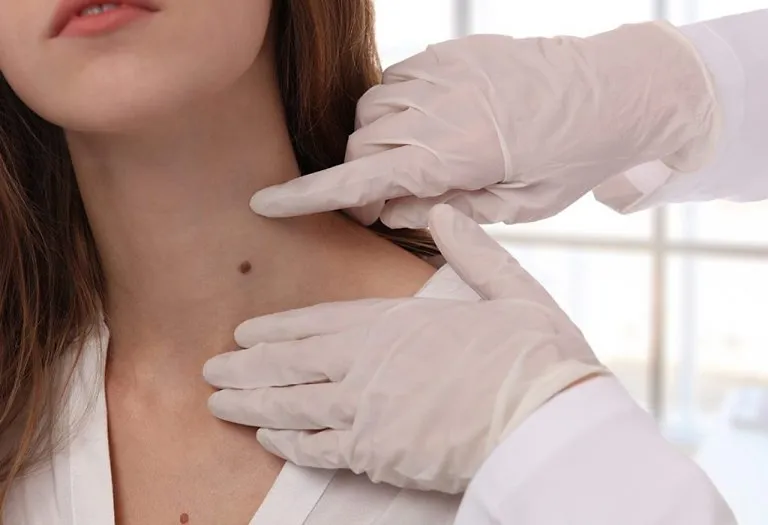Skin Tags During Pregnancy: Causes, Risk and Treatment
Find out what triggers pregnancy skin tags and how to treat them safely and effectively.

- What Are Skin Tags?
- How Common Are Skin Tags in Pregnancy?
- Characteristics of Pregnancy Skin Tags
- How to Identify Skin Tags
- Causes of Skin Tags in Pregnancy
- Can Skin Tags Affect the Baby?
- Risks of Pregnancy Skin Tags
- Treatments for Skin Tags While Pregnant
- How Can Skin Tags Be Prevented During Pregnancy?
- Do the Pregnancy Skin Tags Go Away on Their Own?
- When to Consult the Doctor
- FAQs
You will experience numerous changes during pregnancy, often more than you can count. In addition to the well-known weight gain, food cravings, and morning sickness, you might also notice other less anticipated changes, such as stretch marks, prominent veins, and more. Among these unexpected developments, getting skin tags while pregnant might come as a particular surprise. These small growths can be an unwelcome addition to the list of pregnancy symptoms. This article will help you gain a clearer understanding of the causes and treatment methods of skin tags in pregnancy to manage them effectively during this transformative period.
What Are Skin Tags?
Skin tags are basically small millimetre-sized bumps on the skin that resemble little blobs. They usually appear in areas such as the neck, eyelids, arms, groin, armpits, legs, and so on (1). Skin tags on the breast during pregnancy are also common. Many women are surprised to find a nipple skin tag during pregnancy, a common and typically harmless occurrence due to hormonal shifts and increased skin friction. Skin tags appear randomly and are impossible to predict based on medical history. Also, pregnant women who have already had skin tags might see them increase in number and size during the progression of their pregnancy. Luckily, they usually fall off after you give birth.
How Common Are Skin Tags in Pregnancy?
Skin tags usually occur in around twenty-five per cent of all pregnant women; however, the likelihood of their appearance increases with women who are obese, diabetic or above the age of fifty.
Characteristics of Pregnancy Skin Tags
Here are seven features shared by skin tags that occur during pregnancy:
- Skin tags are usually darker than the normal hue of your skin. This is because the skin is all bunched up together in the tag, concentrating the skin pigment melanin inside.
- Skin tags have a tendency to form in the regions of the skin which tend to get hot or moist.
- The frequency of their appearance increases the further your pregnancy develops, due to your skin rubbing against your clothes.
- Even though they resemble warts, they are harmless, cause no pain and cause little discomfort.
- Skin tags mostly appear around the second and third trimesters.
- Skin tags are often neglected because they are usually unnoticeable, but after delivery, they become very obvious.
- Skin tags can become painful if they are physically injured, such as by excess friction and twisting.
How to Identify Skin Tags
Skin tags are polyps emerging from the skin, possessing a round head and a narrow strip of skin that connects the head to your body. Their colour also changes depending on the type of your skin, for example, white women usually have white or pink skin tags, whereas tan women can have dark or black skin tags.
Causes of Skin Tags in Pregnancy
There are several factors involved in the occurrence of skin tags during pregnancy:
- Hormonal Fluctuations: Hormonal fluctuations during pregnancy can lead to excessive growth of the superficial layer of the skin. Increased levels of hormones such as estrogen and progesterone may contribute to the development of skin tags (2).
- Stretching: It has been suggested that skin tags during pregnancy might result from a combination of overactive hormones and friction. As the belly stretches in the final trimesters, skin friction, particularly in areas where the skin folds or rubs together, can lead to the formation of skin tags.
- Hereditary Factors: There is a hereditary component involved in the formation of skin tags. If other family members have had skin tags, you might be more predisposed to developing them during pregnancy.
- Weight Gain and Obesity: Weight gain and obesity can increase the likelihood of developing skin tags. The additional skin folds created by weight gain may lead to more friction, which can contribute to the formation of skin tags (3).
- Insulin Resistance: Pregnancy can cause temporary shifts in glucose metabolism and lead to insulin resistance, which has been linked to the development of skin tags in some instances.
Can Skin Tags Affect the Baby?
The simple answer to this question is no. Skin tags are a purely cosmetic issue that, in the worst case, might cause some mild discomfort. There is no reason to be worried about them hurting your pregnancy in any way, nor are they indicative of an underlying disorder such as cancer.

Risks of Pregnancy Skin Tags
- There are no risks whatsoever associated with skin tags during your pregnancy. However, take care while attempting to get rid of them.
- Never apply OTC chemicals on the skin as they could enter your body through the skin and affect your pregnancy (4).
- Do not tie a thread around them to prevent their growth. This method will lead to a bacterial infection.
- Finally, if the skin tags become red or painful, contact your doctor immediately.
Treatments for Skin Tags While Pregnant
It’s important to consider the safety of both the mother and the baby when choosing a treatment method during pregnancy. So, how to get rid of skin tags while pregnant? Here are some common approaches to removing skin tags during pregnancy (5):
1 . Medical Treatment
Safe medical procedures are available to remove pregnancy-related skin tags under doctor supervision.
Dermatological Removal
A dermatologist can perform a simple procedure to snip off the skin tag. This method is quick and usually painless, and it may not require anaesthesia. However, it’s advisable to avoid this procedure until after delivery to minimise any potential risks.
Cryotherapy
Skin tags can be treated with cryotherapy, where they are frozen with liquid nitrogen. This technique causes the skin tag to fall off as it thaws and heals. Cryotherapy is typically safe but should be performed under medical supervision.
Electrosurgery
Electrosurgery involves using an electric needle to cauterise and remove the skin tag. This method uses heat to remove the excess skin and can be effective for larger tags.
Prescription Wart Creams
In some cases, wart creams may be prescribed to break down the skin tag. These creams are used after other methods have been attempted and can help in removing any residual tags.
2. Natural Remedies
Some safe, home-based remedies can support the gradual reduction of pregnancy-related skin tags.
Tea Tree Oil
Tea tree oil is a popular natural remedy for skin tags. Its antiviral and antifungal properties may help to dry out and remove skin tags (6). Apply a small amount of diluted tea tree oil to the skin tag twice daily.
Apple Cider Vinegar
Apple cider vinegar is another home remedy believed to help with skin tags. Soak a cotton ball in apple cider vinegar and apply it to the skin tag for about 15-20 minutes daily.
Garlic
Garlic has natural antiseptic properties that may assist in removing skin tags while pregnant (7). Crush a garlic clove and apply it directly to the skin tag, covering it with a bandage. Leave it on overnight and wash it off in the morning.
Aloe Vera
Aloe vera is known for its healing properties and may help to soothe and reduce the size of skin tags. Apply fresh aloe vera gel to the skin tag and leave it on for about 30 minutes before rinsing.
Coconut Oil
Coconut oil has moisturising and healing properties. Applying coconut oil to the skin tag may help to soften and eventually reduce its appearance over time.
Lemon Juice
Lemon juice is a natural astringent due to its citric acid content, which may help break down the cells of the skin tag. Apply a small amount of fresh lemon juice to the skin tag using a cotton swab. Leave it on for about 20 minutes before rinsing. Repeat daily.
Note: Lemon juice can make your skin sensitive to sunlight, so it’s best to apply this at night and ensure the area is protected during the day.
Banana Peel
The inside of a banana peel contains enzymes and antioxidants that are thought to gently break down skin tag tissue (8). Cut a small piece of banana peel and place the inner side directly onto the skin tag. Secure it with a bandage and leave it on overnight. Rinse the area in the morning. Repeat this process nightly.
Care must be taken when using any of these treatments without your doctor’s permission. Please note that unless the skin tag is causing you discomfort, your doctor might refuse to treat you for them during the pregnancy.
How Can Skin Tags Be Prevented During Pregnancy?
While skin tags themselves cannot be entirely prevented, certain measures may help reduce the likelihood of their occurrence or manage contributing factors (9):
- Maintain a Healthy Weight: Although skin tags cannot be entirely prevented, managing weight can be beneficial. If skin tags are linked to obesity, maintaining a healthy weight may help reduce their appearance. However, any weight management efforts should be discussed with your doctor, as weight loss during pregnancy should be approached cautiously and under medical supervision.
- Minimise Friction: Reducing friction in areas prone to skin tags may help lessen their development. Wear loose, comfortable clothing to avoid constant rubbing against the skin. This is particularly important as the body changes and grows during pregnancy.
- Monitor Hormonal Changes: Since hormonal fluctuations play a role in the formation of skin tags, keeping regular check-ups with your healthcare provider can help manage hormonal imbalances. While it’s not possible to entirely control hormonal changes, staying informed and monitored can assist in managing their impact.
Do the Pregnancy Skin Tags Go Away on Their Own?
Pregnancy skin tags generally do not go away on their own. They may persist throughout the pregnancy and sometimes even after delivery. While skin tags are usually harmless, they often require medical or natural treatments for removal if they become bothersome. In many cases, skin tags may remain until after the baby is born, and their appearance might reduce over time as hormonal levels stabilise and the skin returns to its pre-pregnancy state.
When to Consult the Doctor
Knowing when to consult a doctor about skin tags during pregnancy is crucial for ensuring both your well-being and that of your baby. Here are some situations when seeking medical advice is advisable:
- Sudden Increase in Number or Size: If you notice a sudden increase in the number or size of skin tags, it’s important to consult a healthcare provider. This could indicate an underlying issue that may need further evaluation.
- Signs of Irritation or Infection: If a skin tag becomes painful, inflamed, or shows signs of infection such as redness, swelling, or discharge, seek medical attention. An irritated skin tag might require professional treatment to prevent complications.
- Concerns About Appearance or Discomfort: If skin tags cause significant discomfort or affect your quality of life, it’s worth discussing with your doctor. They can offer advice on management strategies or treatments that might provide relief.
- Uncertainty About Diagnosis: If you’re unsure whether a skin growth is a skin tag or something more serious, consult your healthcare provider. Proper diagnosis is essential for ensuring appropriate care and treatment.
- Pre-existing Medical Conditions: If you have pre-existing conditions like diabetes or hormonal imbalances, and you notice new or changing skin tags, consult your doctor. These conditions can influence skin tag development and may need to be managed in conjunction with treatment for the tags.
FAQs
1. Can skin tags on the genitals during pregnancy cause any complications?
Skin tags on the genitals during pregnancy are generally benign and do not cause complications. However, if they become irritated or cause discomfort, it’s best to consult with a healthcare provider for advice on management and potential treatment options.
2. Are skin tags signs of an underlying health condition during pregnancy?
While skin tags themselves are usually harmless, a sudden increase in their number or size could be a sign of an underlying health condition. Conditions like insulin resistance or hormonal imbalances might contribute to their development. It’s important to discuss any concerns with your healthcare provider to rule out any potential issues.
3. Can skin tags affect the delivery process?
Skin tags typically do not affect the delivery process. They are generally small and do not interfere with labour or delivery. However, if skin tags are located in areas where they might be subjected to friction during delivery, it’s worth discussing with your healthcare provider to ensure they are managed appropriately.
4. If I am prone to skin tags, does that predict whether my child will have them later in life?
There is a genetic component to developing skin tags, so a predisposition can be inherited. If you develop a significant number of skin tags during pregnancy, it may indicate a familial tendency. However, their appearance during pregnancy is primarily driven by your unique hormonal response. This does not guarantee your child will develop them, but it may mean they have a higher likelihood compared to someone without a family history.
This was all about skin tags and pregnancy. Skin tags can develop at any stage during your pregnancy, but they are completely natural and only cause cosmetic irritation. Attempting to remove them during pregnancy might be dangerous and is usually fruitless as they tend to come back anyway. The best course of action is to wait for your child to be born before trying to rectify them.
Also Read:
Acne (Pimples) When Pregnant
Migraines during Pregnancy
Getting Moles in Pregnancy
How to Deal With Rashes in Pregnancy?
Was This Article Helpful?
Parenting is a huge responsibility, for you as a caregiver, but also for us as a parenting content platform. We understand that and take our responsibility of creating credible content seriously. FirstCry Parenting articles are written and published only after extensive research using factually sound references to deliver quality content that is accurate, validated by experts, and completely reliable. To understand how we go about creating content that is credible, read our editorial policy here.
1. National Library of Medicine – Skin Tags
2. National Library of Medicine – A study of androgen and estrogen receptors α, β in skin tags
3. American College of Obstetricians and Gynecologists – Weight Gain During Pregnancy
4. National Library of Medicine – Safety of skin care products during pregnancy
5. American Academy of Dermatology Association – Skin tags: why they develop, and how to remove them
7. National Library of Medicine – Garlic in dermatology
9. Cleveland Clinic – Skin Tags (Acrochordons)




































